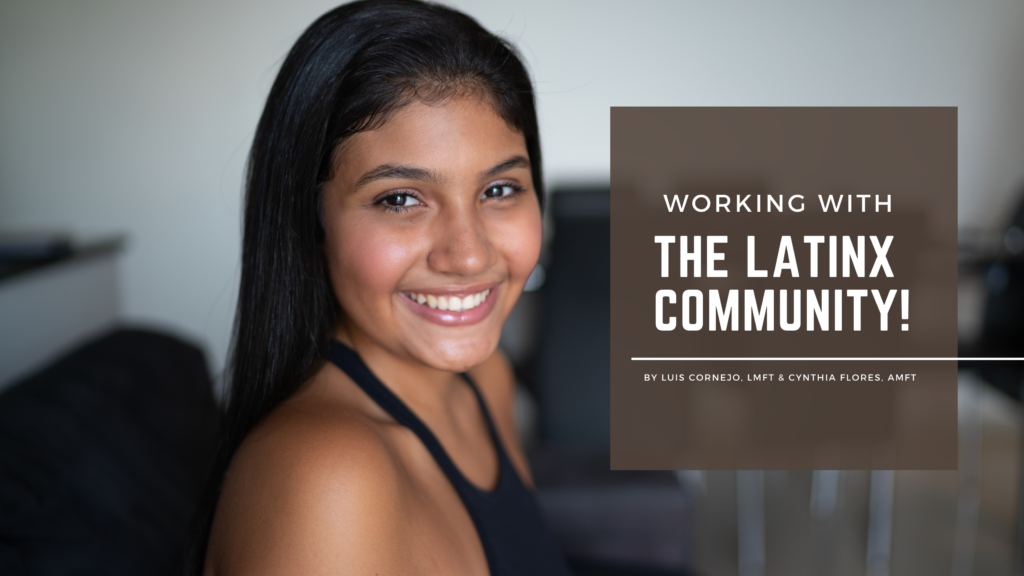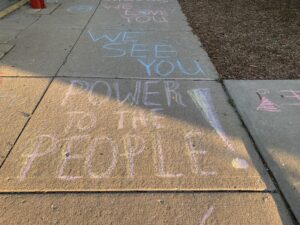
The Latinx community is diverse and ever growing. With a current population of 52 million or 16.7% of the U.S population. Latinx individuals represent one of the largest “minority” groups in the country. Latinx individuals are not all from one country, nor do they share one culture. Rather Latinx is an umbrella term used and adopted primarily in the U.S as a non-gendered way of referring to a group of people. There is a lot of controversy over the use of this word and it is important that we let our clients tell us how they chose to identify within their cultural context. It’s important to also remember that there are great strengths in the community such as resilience, cultural practices, and community building.
Common Areas of Focus for Latinx & First Generation Latinx
- Imposter syndrome (belief that achievements are based on luck & not skill).
- Trauma ( adverse childhood experiences, deportation, community violence, family separation, poverty)
- Feeling stuck in between two cultures
- Limit and boundary setting with family
- Pressure to assist family (financially, emotionally, etc.)
- Language barriers (Not all Latinx people speak Spanish, some speak different languages depending on region and history)
- Pressure to succeed (“American Dream”)
- Guilt and shame
- Distrust of the system (government, police, etc.)
- Gender roles and sexuality
- Internalized oppression
- Navigating within systems (professional settings, 1st generation college student, 1st generation home wonder, 1st generation business owner, etc).
- Stressors related to religious and cultural expectations (marriage, baptism, beliefs, having children, etc).
Best Practices

- Therapist/Client relationships are crucial when working with Latinx individuals. Many Latinx individuals do not trust the system and this includes health care. If you are a non-Latinx individual chances are that you will not be trusted to understand or empathize. Take time to develop a relationship and refrain from making judgements/assumptions about culture, religion, family, or the unique experience of first generation Latinx born individuals. One of the main reasons Latinx individuals don’t return to therapy is because they report not feeling understood by the therapist.
- Tread lightly when discussing family. Explore patterns, relationships, expectations, individual needs vs family needs, and family trauma (ex. immigration). Refrain from making judgements about family or labeling.
- Many Latinx cultures have been healing for hundreds of years. Do not assume that therapy is their first time “doing the work.” Instead ask clients how they have coped, who has motivated them, values, and any traditional/family practices that support their mental health.
- Many Latinx individuals have a variety of superstitions or beliefs that may not make sense to you, however, it’s important to explore pros/cons rather than dismissing or challenging completely.
- Seeing or sensing spirits/feelings is something common. This does not always mean the individual is schizophrenic or psychotic, but may be more sensitive to energy.
- Ask what other traditional healing practices they integrate in their journey.
- Do some research and have some knowledge of each individual’s unique culture within the Latinx umbrella (Guatemalan does not equal Mexican).
- You cannot escape politics. Many Latinx individuals are either well versed or interested in politics for the simple reason that it affects their everyday life and their families. Create space for the client to talk about their views, opinions, and do not avoid the conversation if it is brought in. Also refrain from blaming individuals, remember the law does not benefit nor protect everyone equally. Your experience may vary drastically.
- Have an understanding on how systemic, institutional, intergenerational and historical oppression and trauma impacts the Latinx community, individually, interpersonally and collectively.
- Grief is a common reason why many individuals from Latinx backgrounds come to therapy. Many feel an especially huge sense of loss when it’s a family member who holds a high place in the family (parent, grandparent, aunt or uncle). It is helpful to explore the client’s beliefs about death as well and support them in finding ways to honor the lost family member. Inquire about cultural practices or do some research.
- There may be some difficulties when Latinx individuals try to express certain feelings. Many will provide the word in their language (likely Spanish). These “feelings or experiences” include:
- Ataque de nervios: can best be described as shocked nerves or related to bad spirits.
- Colera/Rabia: Extreme version of anger/rage (mind/body experience or reaction).
- Susto/espanto: Frightening experience that causes strong reaction/fear response.
- Mal de Ojo: The belief that someone cursed/hexed you and is causing physical/emotional/mental harm.
Luis is a Licensed Marriage & Family Therapist who graduated from Long Beach State University with a Masters degree in Counseling Psychology (2015). He also has a Bachelors's degree in Child and Adolescent Development with an emphasis on Public Policy from San Francisco State University (2011). Luis has over 9 years of experience working with children and families both in education and mental health. Previously, Luis worked for a non-profit agency in San Francisco, CA providing mental health consultation in early head start programs and SFUSD pre-schools. Currently, Luis works at Kaiser in San Francisco providing mental health services.
His therapeutic interests include working with Trauma, the LGBTQ community, Children, Families, Couples, and POC. His personal interests include; Films, Reading, Writing, Art, Travelling, Disney, and Food. He is also a recipient of the California State Stipend award (2015). PsychoSocial is part of Luis' dedication to mental health and an example of his passion to educate others. Luis hopes that through PsychoSocial he will be able to help in the fight to end the stigma around mental illness.
#EndtheStigma
-
Luis Cornejo, LMFThttps://psychosocial.media/author/psychosocial/September 18, 2017
-
Luis Cornejo, LMFThttps://psychosocial.media/author/psychosocial/January 28, 2018
Cynthia Flores is a Mexican-American Associate Marriage and Family Therapist born and raised in Salinas, CA.
She currently provides psychotherapy services to children, adults, and families to the Latinx community of San Francisco, CA.
Cynthia is constantly working towards de-stigmatizing and raising awareness on mental health within the BIPOC communities and incorporates a social justice lens as it relates to systemic oppression and the impact it has on our mind, body, and spirit within our communities.
Cynthia has co-facilitated workshops on intergenerational trauma and collective healing and has been invited as a guest in podcasts to share her lived and professional experience in her field.
-
This author does not have any more posts.





















